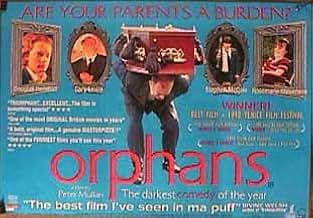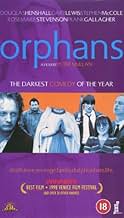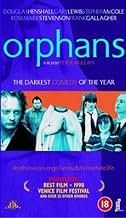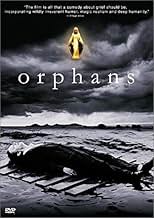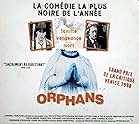Orphans
- 1998
- 1 Std. 41 Min.
IMDb-BEWERTUNG
7,0/10
1872
IHRE BEWERTUNG
Füge eine Handlung in deiner Sprache hinzuFour siblings gathered together for their mother's funeral in Glasgow face individual torments over night during a tumultuous storm that rips the roof off the church.Four siblings gathered together for their mother's funeral in Glasgow face individual torments over night during a tumultuous storm that rips the roof off the church.Four siblings gathered together for their mother's funeral in Glasgow face individual torments over night during a tumultuous storm that rips the roof off the church.
- Auszeichnungen
- 10 Gewinne & 2 Nominierungen insgesamt
Linda Jane Devlin
- Evelyn (Waitress in Bar)
- (as Linda Cuthbert)
Empfohlene Bewertungen
7imxo
Wow, what a night this has been. It started off with Glasgow's very interesting "Orphans", and finished with Berlin's equally interesting "Nighshades"; the first was a black comedy, the second merely black. My advice to the neighbors of these Glaswegians and Berliners would be: keep your doors locked.
Both of these films deal with the eternal verities of life - love, loyalty, friendship, duty, betrayal, etc. - as encountered amid the emotional squalor in two of northern Europe's major cities, but there are enough sociopathic and psychopathic characters in these two films to populate several good sized asylums for the criminally insane. These people need to get more sun.
"Orphans", at least, was a bittersweet black comedy, though more bitter than sweet. Life might be hard in inner-city Glasgow, but some of their vendettas would seem more appropriate to Sicily than to Scotland. There is a harshness to the humor that is at times more than black. Death can often be funny, but can one say the same for rape and murder - even when not fully consumated? Perhaps the English can enjoy this bit of schadenfreude at the Scots' expense.
I have only one real complaint about "Orphans", however, and it's a technical one. The film has the WORST SUBTITLES EVER PUT ON FILM - and they're English-to-English! If the characters are speaking English - heavily accented though it may be - why on earth would the dialog itself be changed in the sub-titles? Do the people responsible really believe that they have to substitute the word "baby" in the sub-titles every time a Glaswegian holding a child makes a reference to the "wee 'un?" And to hear the characters actually say the "F" word dozens of times, yet find the word in the sub-titles not once is very odd. Maybe these sub-titles are a part black-comedy in themselves. Ultimately, though, they are just disappointing and unprofessional. In the event, I would certainly recommend this film for it's superb acting - at least I hope it's acting - black humor, and unique take on Death in Glasgow, but when it comes to your summer holidays I'd recommend giving working-class Glasgow a very wide berth. Ditto for Berlin.
Both of these films deal with the eternal verities of life - love, loyalty, friendship, duty, betrayal, etc. - as encountered amid the emotional squalor in two of northern Europe's major cities, but there are enough sociopathic and psychopathic characters in these two films to populate several good sized asylums for the criminally insane. These people need to get more sun.
"Orphans", at least, was a bittersweet black comedy, though more bitter than sweet. Life might be hard in inner-city Glasgow, but some of their vendettas would seem more appropriate to Sicily than to Scotland. There is a harshness to the humor that is at times more than black. Death can often be funny, but can one say the same for rape and murder - even when not fully consumated? Perhaps the English can enjoy this bit of schadenfreude at the Scots' expense.
I have only one real complaint about "Orphans", however, and it's a technical one. The film has the WORST SUBTITLES EVER PUT ON FILM - and they're English-to-English! If the characters are speaking English - heavily accented though it may be - why on earth would the dialog itself be changed in the sub-titles? Do the people responsible really believe that they have to substitute the word "baby" in the sub-titles every time a Glaswegian holding a child makes a reference to the "wee 'un?" And to hear the characters actually say the "F" word dozens of times, yet find the word in the sub-titles not once is very odd. Maybe these sub-titles are a part black-comedy in themselves. Ultimately, though, they are just disappointing and unprofessional. In the event, I would certainly recommend this film for it's superb acting - at least I hope it's acting - black humor, and unique take on Death in Glasgow, but when it comes to your summer holidays I'd recommend giving working-class Glasgow a very wide berth. Ditto for Berlin.
When I checked this film on IMDB, I was surprised. Not by the popular rating, 6.7 out 10 is a good mark but by the number of votes. Only, 368 votes! How can such a good movie by largely ignored by the public?
Peter Mullan in the world of British cinema is especially known as an actor. We remember his performance in the trendy "Trainspotting" (1996) where he acted the role of a heroin supplier. With "Orphans", he decided to display his gifts as a director. He chose wisely. His real debut movie is, by any standards a remarkable one. However I am obliged to recognize that for his first direction, the place of the action which the city of Glasgow in Scotland has nothing welcoming. Indeed, most of its inhabitants are narrow-minded or unpleasant. I read a few reviews about Mullan's film and all of them had said that Glasgow's inhabitants are really like this. If it is true, truth is stranger than fiction.
But also Mullan for his first directing chose a tough topic: what can be the childrens' reactions following the death of their mother? To answer this question, the filmmaker divided his movie in 4 individual parts. Each one focuses on one of the 4 main characters. Thus, we can say the following answer to the quoted question: either with violence (John, the college boy who tries to prove himself as a hard man) either with obstinacy (Thomas, the holier-than-thou chief mourner who wants everything to be perfect for their mother's funeral). As for the two others, Michael and Sheila, they feel especially lost. What Mullan tries to reveal to the spectator is that these reactions are necessary because this painful hardship represents for them the definitive transition in adulthood and maturity. The very last sequence shows the three brothers and the disabled sister together and they seem more united.
"Orphans" is a movie that swings between humor and poignancy, violence and calm with ease. Moreover, the moment when the roof of the church is torn off by the wind gives the film a little surrealist air. In short, it easily ranks among the best British movies of the nineties and it deserves to be better known. At last, given the success of "the Magdalene sisters" in 2003, Peter Mullan is well away to become one of the finest British directors of these last years.
Peter Mullan in the world of British cinema is especially known as an actor. We remember his performance in the trendy "Trainspotting" (1996) where he acted the role of a heroin supplier. With "Orphans", he decided to display his gifts as a director. He chose wisely. His real debut movie is, by any standards a remarkable one. However I am obliged to recognize that for his first direction, the place of the action which the city of Glasgow in Scotland has nothing welcoming. Indeed, most of its inhabitants are narrow-minded or unpleasant. I read a few reviews about Mullan's film and all of them had said that Glasgow's inhabitants are really like this. If it is true, truth is stranger than fiction.
But also Mullan for his first directing chose a tough topic: what can be the childrens' reactions following the death of their mother? To answer this question, the filmmaker divided his movie in 4 individual parts. Each one focuses on one of the 4 main characters. Thus, we can say the following answer to the quoted question: either with violence (John, the college boy who tries to prove himself as a hard man) either with obstinacy (Thomas, the holier-than-thou chief mourner who wants everything to be perfect for their mother's funeral). As for the two others, Michael and Sheila, they feel especially lost. What Mullan tries to reveal to the spectator is that these reactions are necessary because this painful hardship represents for them the definitive transition in adulthood and maturity. The very last sequence shows the three brothers and the disabled sister together and they seem more united.
"Orphans" is a movie that swings between humor and poignancy, violence and calm with ease. Moreover, the moment when the roof of the church is torn off by the wind gives the film a little surrealist air. In short, it easily ranks among the best British movies of the nineties and it deserves to be better known. At last, given the success of "the Magdalene sisters" in 2003, Peter Mullan is well away to become one of the finest British directors of these last years.
Unfortunately, i didn't watch the movie "Trainspotting", so i missed Mullan's acting in that film. I knew that "Orphans" is the first directorial debut of Mullan.
The entire film has been brilliantly directed.The story of the movie in short: four brother and sister gather at a stormy night for their mother's funeral.As they gather, their love, hate, grief, for each other are expressed individually in that brilliant drama.
The entire cast and music are nice. actually, i like Stevenson's acting as "Sheila". She is brilliant.
Congratulation Mullan to direct such a brilliant drama!
I would like to rate this movie : 8 out of 10.
The entire film has been brilliantly directed.The story of the movie in short: four brother and sister gather at a stormy night for their mother's funeral.As they gather, their love, hate, grief, for each other are expressed individually in that brilliant drama.
The entire cast and music are nice. actually, i like Stevenson's acting as "Sheila". She is brilliant.
Congratulation Mullan to direct such a brilliant drama!
I would like to rate this movie : 8 out of 10.
What starts out as simple film about four siblings trying to cope with their mother's death, soon becomes a surreal tour-de-force. Peter Mullen pulls off a very tricky script and several changes of mood in the film to create something quite unique. There are some marvellous set pieces in here. It's a brave choice to use black comedy to highlight the pain of bereavement, but Orphans triumphantly pulls it off.
It's just a shame the film company buried the film, as this is one of the great British movies of the last few decades.
It's just a shame the film company buried the film, as this is one of the great British movies of the last few decades.
With his third film as director Neds seeing release just recently, the previous two films of Peter Mullan were given a back-to-back television showing. I managed to catch his first, Orphans, having never before heard anything of it.
Meeting to mourn the loss of their mother, four Glaswegian siblings gather in a pub. When an inconsiderate group laugh at the lugubrious singing of the eldest, one of his brothers retorts physically and is stabbed. The remaining brother vows to avenge this whilst the handicapped sister finds herself stuck in a darkened alley, her wheelchair broken.
Orphans begins with a solemn scene, the four siblings gathered around their mother's coffin. Some gentle humour is created through the siblings' confusion at their elder's request that they place some hair in the coffin. This introduces us to the film's primary structure: scenes of genuine heartfelt drama lined with a subtle comedy to balance the mood. As things progress, we begin to see in increase in this comic factor, the film's clever blending of its contrasting elements creating a wonderful dichotomy. The true beauty of the film, however, is in its juxtaposition of its constituent elements. Many are the scenes which Mullan allows to play out, drawing us in with a barrage of riotous laughter, before effortlessly turning this on its head with a disarming simplicity and forcing us to comprehend the dramatic implications of the events unfolding before us. In a simple moment, we go from laughing at something to considering its grim seriousness. It is a stunning effect, one often attempted but rarely realised so fantastically as here. Mullan ends his scenes by inviting us to reconsider what we have just seen; we find ourselves looking at events with a melancholy when just moments ago they had us reduced to breathless laughter. He allows us to indulge ourselves in the fantastic comedy his writing engenders before showing us that these scenarios are in fact tremendously dark and dramatic. We may chuckle at Michael's determination to pass off his stab wound as an industrial accident, but we quickly reevaluate the true humour of this when we realise that he is slowly dying, his lightening pallor eventually quite frightening. This is just one example of the many such twists Mullan throws at us, showing himself to be as dramatically dark as he is ingeniously funny.
A truly fantastic combination of drama and comedy, done in a subversive way which forces us to reevaluate what we thought of a scene just seconds before, Orphans is a fantastic exploration of the closeness of drama and comedy. Splendidly supported by fantastic, hilarious, and realistically authentic Glaswegian performances, this film has certainly proclaimed Peter Mullan as a masterful director.
Meeting to mourn the loss of their mother, four Glaswegian siblings gather in a pub. When an inconsiderate group laugh at the lugubrious singing of the eldest, one of his brothers retorts physically and is stabbed. The remaining brother vows to avenge this whilst the handicapped sister finds herself stuck in a darkened alley, her wheelchair broken.
Orphans begins with a solemn scene, the four siblings gathered around their mother's coffin. Some gentle humour is created through the siblings' confusion at their elder's request that they place some hair in the coffin. This introduces us to the film's primary structure: scenes of genuine heartfelt drama lined with a subtle comedy to balance the mood. As things progress, we begin to see in increase in this comic factor, the film's clever blending of its contrasting elements creating a wonderful dichotomy. The true beauty of the film, however, is in its juxtaposition of its constituent elements. Many are the scenes which Mullan allows to play out, drawing us in with a barrage of riotous laughter, before effortlessly turning this on its head with a disarming simplicity and forcing us to comprehend the dramatic implications of the events unfolding before us. In a simple moment, we go from laughing at something to considering its grim seriousness. It is a stunning effect, one often attempted but rarely realised so fantastically as here. Mullan ends his scenes by inviting us to reconsider what we have just seen; we find ourselves looking at events with a melancholy when just moments ago they had us reduced to breathless laughter. He allows us to indulge ourselves in the fantastic comedy his writing engenders before showing us that these scenarios are in fact tremendously dark and dramatic. We may chuckle at Michael's determination to pass off his stab wound as an industrial accident, but we quickly reevaluate the true humour of this when we realise that he is slowly dying, his lightening pallor eventually quite frightening. This is just one example of the many such twists Mullan throws at us, showing himself to be as dramatically dark as he is ingeniously funny.
A truly fantastic combination of drama and comedy, done in a subversive way which forces us to reevaluate what we thought of a scene just seconds before, Orphans is a fantastic exploration of the closeness of drama and comedy. Splendidly supported by fantastic, hilarious, and realistically authentic Glaswegian performances, this film has certainly proclaimed Peter Mullan as a masterful director.
Wusstest du schon
- WissenswertesPeter Mullan was horrified to learn that the film's production company, FilmFour, had accidentally burned over 30 minutes of footage. This was due to a clerical error.
Top-Auswahl
Melde dich zum Bewerten an und greife auf die Watchlist für personalisierte Empfehlungen zu.
- How long is Orphans?Powered by Alexa
Details
- Erscheinungsdatum
- Herkunftsland
- Sprache
- Auch bekannt als
- Ett sista farväl
- Drehorte
- Produktionsfirmen
- Weitere beteiligte Unternehmen bei IMDbPro anzeigen
Box Office
- Bruttoertrag in den USA und Kanada
- 54.754 $
- Eröffnungswochenende in den USA und in Kanada
- 16.098 $
- 12. März 2000
- Weltweiter Bruttoertrag
- 54.754 $
- Laufzeit1 Stunde 41 Minuten
- Farbe
- Sound-Mix
- Seitenverhältnis
- 1.85 : 1
Zu dieser Seite beitragen
Bearbeitung vorschlagen oder fehlenden Inhalt hinzufügen



